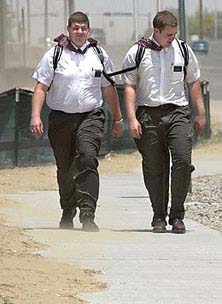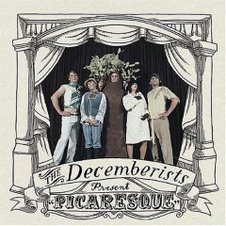Everybody likes to hear other people's confessions. It piques our curiosity and often makes us feel better about ourselves. "My life may suck, but at least I'm not that screwed up!" St. Augustine wouldn't be half as popular today had he titled his book "Interminable Religious Ramblings." He certainly wouldn't have a Spring Break city named after him.
Geoff J.'s
comment on my earlier post and his
follow-up post at his site have prompted me to confess something. According to Geoff, studying the Church is all fine and dandy, but at the end of the day, you have to ask God for confirmation. You have to, in his words, puncture the veil. My confession is that I have never punctured the veil. Furthermore, I have never attempted to test
Moroni's promise, despite telling innumerable people on my mission to do just that. Yes, I'm a hypocrite of the worst kind.
The question arises: why not? After all those years growing up, and during two years of a mission, why the hell didn't you ask? I was scared. I was scared that I would pour my whole soul into it and not get an answer. I was happy surviving off the occasional warm fuzzy and not taking the big gamble. I had plenty of doubts, but the Church was true enough for me.
This worked fine until one day when I was teaching a discussion to a woman during my mission. I recorded the event in my mission journal:
"... the reason [the discussion] was so disturbing was that [Elder X] gave his testimony that he asked God if the Book of Mormon was true and if Joseph Smith was a prophet and he was answered by a good feeling--and I thought, 'Good, I don't have to say anything.' So I told her I knew Joseph was a prophet and the Book of Mormon was true because I felt it inside. She point-blank asked me if I had done the same as [Elder X] and I said yes and felt terrible. I don't think that was true. I haven't asked and received an answer like [Elder X] but I know it's true; it's hard to explain. But she knew just where to pin me down and she won. That was incredibly disturbing. I felt as though for the first time my lack of testimony, lack of preparation was hurting someone else. I felt at that moment that if she didn't get baptized her blood would be on my head."
I was attempting to skate a Clinton-esque line and my investigator called me on it. What was I supposed to say? "You're right, I haven't asked either. I'm secretly afraid that my religion isn't even true. I don't even know why I'm here." Well, that probably would have been preferable to lying, but we can't change our past choices. I decided to go with the party-line and hope for the best. I still feel guilty when I think about that discussion.
The logical question that follows is, now that you don't believe, why not ask now? Well, I'm still scared, but perhaps the other way now. Maybe I'd get an affirmative response. (It is at this point, reader, where you can make the exclamation, "My life sucks but at least I'm not as screwed up as Ned!")
I'm beginning to have doubts about the validity of the whole enterprise of asking God. It seems set up to favor only one outcome. If we ask and don't receive a response, then possibly we weren't asking hard enough or we hadn't studied it out in our minds properly. Perhaps we felt nothing because we had sins that blocked the Holy Ghost or we weren't sincere enough. How can we distinguish between a negative response and a non-response? Maybe we didn't want to believe enough.
I think that's part of the problem. I don't
want to believe. There are so many things that bother me about the Church, I can't imagine the size of the shelf needed to house all my concerns. How can I ask sincerely if deep down I don't want to have to deal with all the thorny issues? I think the Sunday School answer is that I have humble myself and be prepared to accept polygamy, blacks not having the priesthood, and Boyd K. Packer. I just don't think I can do that.
Does it make sense to ignore facts we don't like and rely solely on a spiritual witness? Does rationality not always apply in spiritual matters? Does it make sense to have different rules and standards for our knowledge about religion than, say, science?
My confession, besides the fact that I am a liar and a hypocrite, is that I don't trust myself to recognize the truth.
 Pretty freakin' sweet.
Pretty freakin' sweet.





